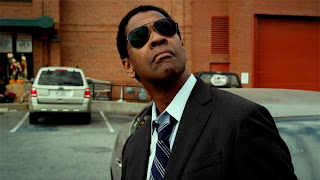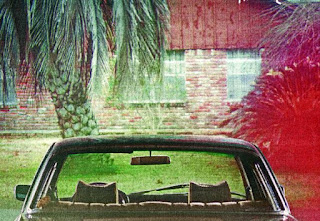Flight Review
Does it soar or crash and burn?
Full review by Isaac Handelman
Being Robert Zemeckis’ long awaited return to the director’s chair in a live-action film after a thirteen year hiatus, Flight has some lofty expectations to stand up to. It’s a grand, ambitious effort that sets its sights high -- and its airplane even higher. Zemeckis quite obviously wants quite badly for this to be his next Forrest Gump or Cast Away. Is it? Well, that depends on how much you liked Forrest Gump and Cast Away. What I can tell you is that Flight manages to hit most of the right notes but not without singeing its wings in a few prominent places.
Flight tells the story of Captain William Whitaker (Denzel Washington), an airline pilot who’s battling alcoholism and drug addiction. During a routine flight, Whitaker suddenly finds his plane in a nosedive and is forced to take evasive action. That evasive action just so happens to include flying the plane upside down for a short stint, but hey, who ever said there’s anything wrong with a little eye candy now and then? After awakening in the hospital to find himself praised as a national hero, Whitaker is promptly placed under investigation, charged with being intoxicated on the day of the crash.
However, the film isn’t truly about Whitaker’s investigation or the trial that ensues. Instead, Zemeckis chooses to focus almost entirely on his internal clash with alcoholism. After the plane crash sequence which comes somewhat early on, the film shifts most of its power towards backing Whitaker’s internal struggle.
Flight tries to touch on a near-countable volume of ideas, but most of them can be disregarded as unneccessary fluff. Whitaker’s relationship with his ex-wife and son never extends beyond feelings of petty disconnect. Whitaker’s love of flying is never given enough time in the spotlight to go anywhere interesting. Whitaker’s relationship with recovering drug addict Nicole feels contrived -- it’s difficult to have much care for the couple when we’re given no clear explanation as to why they like each other in the first place. In the end, Whitaker’s internal battle is the only one the film succeeds at fully fleshing out. That’s typical Zemeckis, of course. He’s a filmmaker whose lofty ambitions can sometimes hinder his ability to get off the ground (no pun intended). Thankfully, if you’re willing to look past the shortcomings of the film’s many attempts at viable subplots, you’ll find that the central narrative is smartly written, well-constructed and usually compelling.
I say “usually” because the film loses some steam towards its middle part. Robert Zemeckis is a man known for justifiably long movies, and Flight clocks in as one of his shortest so far, running at just shy of two hours and twenty minutes, and as such it’s a tad surprising that he isn’t quite able to keep the momentum up throughout Flight’s entirety. The film is never boring, per se, but by the fourth time Whitaker has failed to confront his alcoholism and instead chooses to keep drinking, I was about ready to stand up and yell, “All right, I get it, he’s a drunk. Get on with it.” In addition, Whitaker’s initial reasoning for getting sober is flawed. The single greatest victory of his life, successfully landing a plane in a manner no one else could have, came at a time when he had just downed three shots of vodka. His immediate reaction? To dump all his liquor down the drain. I’m not advocating flying under the influence, but it’s difficult to see the logic behind that decision.
And speaking of questionable logic, there's a scene towards the end of the film where Whitaker's buddy brings him a troublingly large amount of cocaine in an attempt to reinvigorate him after alcohol has left him slumped on his bathroom floor. We're asked to take the scene as comedic, and yet the subject matter is extremely dark. It's a bizarre mix that clashes with the film's central theme of the negative effects of alcohol and drugs.
Flight is superbly acted, which isn’t surprising considering the pedigree of the cast. Washington plays an impeccable Whitaker, imbuing his character with a strong sense of regret and a wish for redemption, even if a few of his lines feel a bit corny (I’m looking particularly at a scene that takes place between Whitaker and Nicole in his barn). Don Cheadle plays his confident big-city lawyer part well, and John Goodman steals every scene he’s in as Whitaker’s crass, goofy friend/dealer.
It must be pointed out that Flight soars when it takes flight. Its pivotal plane crash sequence is wrought with tension and heavy in its emotional poignancy. As Whitaker makes each instinctual decision, culminating in the plane’s crash, the audience is immersed and enveloped by the raw intensity of the scene. Though I would’ve liked to see the crash revisited, investigated and expanded upon in greater detail than it was, that initial thrill -- that raw, powerful feeling of impact -- stands as one of Flight’s greatest successes.
With Flight, Zemeckis’ untethered ambition reaches new heights, and yet it’s tough not to be just a tad disappointed by the film. That’s a shame, really. It comes with its fair share of hiccups, a cheesy line here and there and some notable narrative inconsistencies and unnecessary repetition. Having said that, it’s necessary to congratulate Zemeckis and company on what they have achieved: constructing a well-developed internal battle between one man and his demons, and doing it in a way that’s wholly original and exciting. Flight may not be one of the most refined or focused cinematic experiences of the year, but it’s surely one of the most unique. Oh, and that last line -- wow. What a zinger.
Final Score:
6.5/10
“Satisfactory”




Comments
Post a Comment